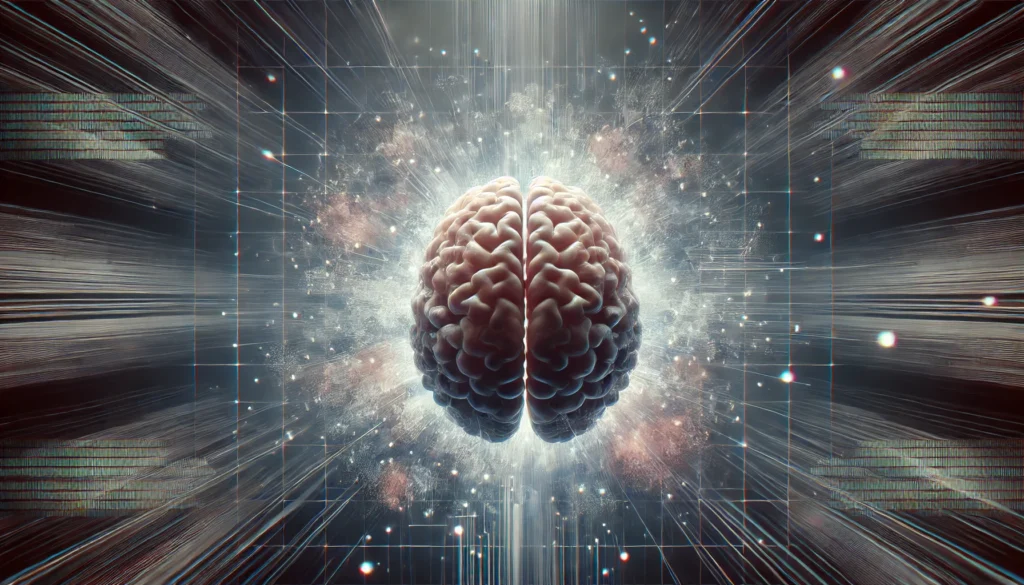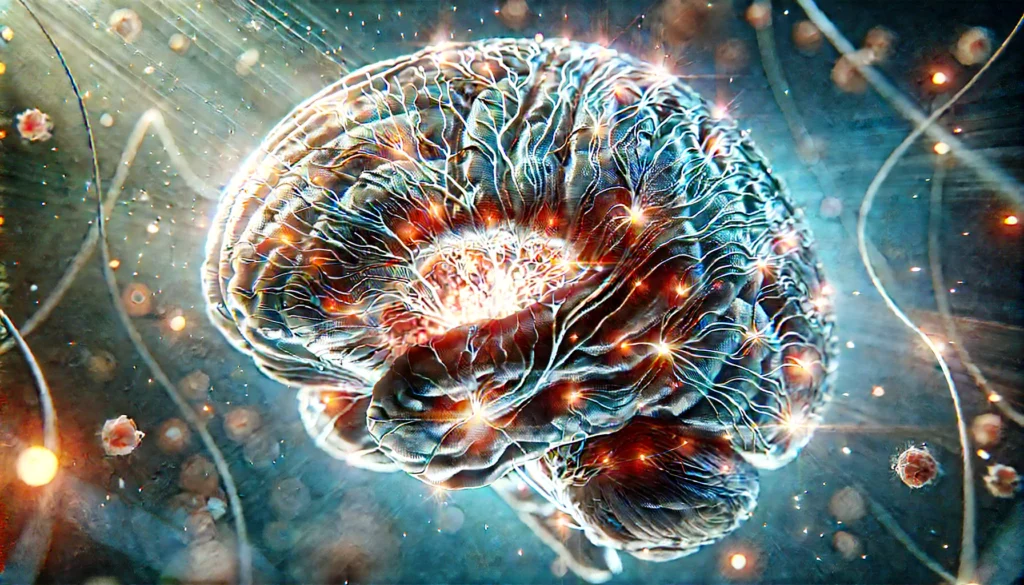Introduction
There are moments when a person feels mentally absent, as if their cognitive engine has abruptly come to a halt. This experience, often described as a “brain stopped” or “brain dead feeling,” can be both alarming and debilitating. It is not simply about being tired or distracted—it’s the overwhelming sensation that the mind is blank, disconnected, or not fully present. For many, it manifests suddenly, while for others, it emerges gradually until everyday functioning becomes a struggle. These experiences can mimic or mask neurological conditions, psychological disorders, or physiological stress responses, making it crucial to understand their underlying causes.
You may also like: Do Carbs Cause Brain Fog? What Science Reveals About Carbohydrates and Mental Clarity
The sensation of a mental shutdown can feel like losing access to one’s own thoughts. Tasks that were once simple—like recalling a name, solving a basic problem, or following a conversation—may become daunting or impossible. The brain may feel slow, foggy, or even emotionally numb. Describing it to others can be frustrating, especially when the symptoms lack outward physical signs. People often say they feel like they’re watching life unfold from behind a foggy window.
This article will explore the scientific, neurological, psychological, and physiological roots behind the sensation of mental disconnection. We’ll examine what might cause your brain to feel like it has stopped working, the conditions that contribute to a brain dead feeling, and the most effective ways to diagnose, treat, and manage these disturbing experiences. Whether it’s burnout, neurological dysregulation, chronic illness, trauma, or a more acute neurological event, the reasons behind this phenomenon are vast but manageable when properly understood.
Understanding why the brain feels like it has shut down isn’t just about comfort—it’s about protecting long-term cognitive health. Left unaddressed, repeated episodes of cognitive disengagement can lead to anxiety, depression, or exacerbate underlying neurological conditions. Through a deeper understanding, we can learn how to recover cognitive clarity, build emotional resilience, and develop sustainable habits to protect brain health for life.

What Does It Mean When Your Brain Feels Like It Stopped?
The term “brain stopped” is not a formal medical diagnosis but a colloquial expression used to describe a subjective experience of abrupt mental disengagement. Individuals may describe it as their thoughts freezing, memory going blank, or their cognitive gears grinding to a halt. It’s a temporary sensation, but it can feel intensely real, as if the brain momentarily ceased to function.
This feeling can be the result of sudden neurological overload, psychological defense mechanisms, or physiological stress responses. When the brain encounters more information or stimuli than it can process, it may momentarily shut down certain functions to protect itself. This is similar to how a computer freezes under too much data processing pressure—it doesn’t mean the system is broken, but that it’s overwhelmed.
Biologically, this may involve disrupted neural communication in areas responsible for attention, memory, and executive function—especially the prefrontal cortex, hippocampus, and anterior cingulate cortex. Temporary blood flow issues, neurotransmitter imbalances (like low dopamine or high cortisol), and overstimulation of the amygdala may also contribute.
Mentally, the experience of a brain stopped moment may feel like time slows down, sensory awareness blurs, and external input becomes hard to interpret. Tasks may be abandoned mid-process, sentences may trail off, or a person may stare blankly into space. For some, this is followed by a return to normal after a few seconds or minutes; for others, recovery can take hours or longer, especially if the episode is linked to deeper fatigue or illness.
Understanding this state helps reduce fear around it. While unnerving, it is often reversible and, with proper care, manageable. Identifying the context in which it occurs—stress, sleep deprivation, trauma, overstimulation—can reveal what the brain is responding to and how best to support recovery.

The Brain Dead Feeling: A Closer Look at the Experience
Unlike the actual clinical condition of brain death—which involves the irreversible cessation of all brain activity—the term “brain dead feeling” is used metaphorically to describe extreme mental and emotional numbness. Individuals often report feeling disconnected from themselves and their surroundings, as if their inner world has dimmed or gone offline. It is a profound experience of psychological and cognitive inertia.
This sensation can feel like a void where thoughts once existed. People describe losing their internal monologue, being unable to feel emotions deeply, or having difficulty interpreting reality. They may still speak, move, or function outwardly, but inside, everything feels muted, distant, or hollow.
Neurologically, this condition can be linked to disruptions in default mode network (DMN) activity, which is involved in self-referential thought and introspection. Depression, dissociation, PTSD, and severe burnout are all known to interfere with DMN function, leading to the classic symptoms of a brain dead feeling. Additionally, chronic stress may desensitize reward pathways, leading to emotional blunting and apathy.
It’s also possible for this state to result from neuroinflammation, neurotoxicity, or medication side effects. Antipsychotics, sedatives, and certain SSRIs, while helpful for many, can occasionally lead to emotional dulling that feels like the mind is fading. Similarly, long COVID, chronic fatigue syndrome (CFS), and post-viral syndromes have been known to cause episodes of mental disconnection.
It is critical to validate this feeling without mislabeling it. When someone says they feel brain dead, they are not being dramatic—they are trying to articulate a state of distressing mental dormancy that deserves clinical attention, compassion, and investigation. Identifying underlying causes and choosing the right treatment can gradually help restore cognitive liveliness and emotional presence.

Neurological and Cognitive Factors Behind Sudden Mental Disconnection
Several neurological factors may contribute to the feeling that your brain has stopped working. At the core is often a disruption in cognitive networks that coordinate attention, memory, and processing speed. The prefrontal cortex, which governs higher-level thinking, and the limbic system, which manages emotion, are particularly vulnerable to dysfunction from stress, trauma, inflammation, or disease.
Mild traumatic brain injuries (mTBI), including concussions, are well-known for triggering temporary or persistent episodes of cognitive fog or shutdown. Even without a visible injury, mechanical stress on neurons can impair communication between brain regions, leading to sudden confusion, speech disruptions, and difficulty concentrating—classic markers of a brain stopped event.
Neurodegenerative conditions like early-stage Alzheimer’s disease, Parkinson’s, or multiple sclerosis can also cause sporadic moments of cognitive disengagement, especially during periods of overstimulation or fatigue. These are often accompanied by subtle changes in memory, motor function, or mood.
Furthermore, seizures—particularly absence seizures or partial complex seizures—may be mistaken for episodes where the brain feels like it has gone offline. These involve brief, sudden lapses in awareness, staring spells, or unresponsiveness, often with no memory of the event afterward.
Inflammation and autoimmune responses in the brain, as seen in autoimmune encephalitis or neuroinflammatory syndromes, can also cause dramatic shifts in cognition, personality, and consciousness. In these cases, a brain dead feeling may reflect real physiological distress requiring urgent evaluation.
EEG studies, cognitive testing, and neuroimaging (like MRI or PET scans) are often needed to explore these roots. While not all brain stopped sensations point to neurological illness, ruling out organic causes is an essential first step before attributing symptoms to stress or psychological factors alone.

Psychological Causes: Trauma, Burnout, and Dissociation
Emotional trauma, chronic stress, and psychological overload are some of the most common non-neurological reasons people experience brain stopped or brain dead feelings. These are not imaginary or “just in your head” experiences—they are powerful physiological responses to emotional overload.
One key contributor is burnout. Originating from prolonged exposure to stress without adequate recovery, burnout leads to emotional exhaustion, depersonalization, and reduced cognitive function. In late stages, individuals may feel mentally dead, disconnected, and incapable of focusing, remembering, or engaging with tasks or people. This is especially common in caregiving professions, high-pressure jobs, or chronic illness settings.
Trauma also plays a central role. In the face of overwhelming threat, the brain may enter a freeze response—an evolutionary mechanism for survival. When this freeze response is prolonged or becomes habitual, it can cause dissociative symptoms, including derealization, depersonalization, and mental disconnection. People may say their mind goes blank, the world feels unreal, or they feel as if watching themselves from outside their body.
Post-traumatic stress disorder (PTSD) often includes cognitive shutdown episodes, especially when a person is triggered. The brain protects itself by disengaging from painful stimuli. Complex PTSD, often rooted in childhood trauma, can make these shutdowns more chronic or unpredictable.
Anxiety and depression can also cause what is known as “cognitive fatigue.” Constant worry or emotional flatness drains the brain’s energy resources, leading to moments where the mind simply checks out.
Psychotherapy, especially trauma-informed care, can be transformative. Modalities like EMDR (Eye Movement Desensitization and Reprocessing), somatic experiencing, and internal family systems (IFS) therapy help reintegrate dissociated parts of the self and restore cognitive clarity. Addressing the root emotional wounds behind these mental shutdowns is crucial for sustainable healing.
Frequently Asked Questions
1. What does it mean when I suddenly feel like my brain stopped?
Suddenly feeling like your brain has stopped can indicate a temporary shutdown of higher cognitive functions due to stress, overstimulation, or neurological fatigue. It may occur during periods of mental overload, emotional distress, or physiological strain. Often, it reflects the brain’s attempt to protect itself from further stress by reducing processing capacity. While this feeling is typically reversible, if it recurs frequently or interferes with daily life, it’s important to consult a healthcare provider to rule out underlying medical or neurological conditions.
2. Is a brain dead feeling the same as being in a coma?
No, a brain dead feeling is a subjective psychological or cognitive experience, whereas brain death is a clinical diagnosis indicating the complete and irreversible cessation of brain function. People who feel “brain dead” are very much alive and often physically functional but mentally and emotionally disconnected. This sensation can stem from depression, trauma, stress, or burnout, and while it is distressing, it does not mean that one is medically brain dead.
3. What conditions can cause my brain to feel like it’s shutting down?
Several conditions can contribute to this experience, including anxiety, depression, PTSD, chronic fatigue syndrome, long COVID, fibromyalgia, and neuroinflammatory diseases. Neurological conditions such as concussions, early Alzheimer’s disease, epilepsy, or autoimmune encephalitis may also trigger these sensations. Lifestyle factors like sleep deprivation, malnutrition, substance withdrawal, and overexposure to digital screens can exacerbate the risk.
4. Can mental exhaustion make it feel like my brain stopped?
Absolutely. Mental exhaustion from chronic stress, multitasking, emotional labor, or information overload can lead to temporary shutdowns of executive function. The brain, when fatigued, may reduce activity in areas responsible for planning, memory, and emotional regulation. These shutdowns are not signs of permanent damage but signal that rest and recovery are urgently needed. Addressing sleep, nutrition, and stress is often the first step in reversing these effects.
5. How can I tell if my brain stopped feeling is a medical emergency?
If the sensation is accompanied by slurred speech, loss of consciousness, severe confusion, weakness on one side of the body, or difficulty breathing, it may be a sign of a stroke, seizure, or other acute neurological event—and requires immediate medical attention. If the feeling comes on gradually or in response to stress without physical symptoms, it’s less likely to be an emergency but should still be evaluated if persistent.
6. Is it normal to feel mentally blank during stressful times?
Yes, feeling mentally blank or numb during stress is a common survival response. The brain may prioritize basic survival tasks and deactivate complex thought processes to conserve energy. However, if this becomes a frequent coping mechanism, it may indicate chronic stress, unresolved trauma, or early burnout. In such cases, it’s advisable to seek support from a mental health professional.
7. Can medication cause brain dead feelings?
Some medications, particularly sedatives, antidepressants, antipsychotics, and mood stabilizers, may cause mental fog, emotional blunting, or dissociation as side effects. If you’ve started a new medication and feel mentally shut down or numb, consult your prescribing doctor. Adjusting dosage, switching medications, or supplementing with supportive therapies can help manage these side effects.
8. What can I do when I feel like my brain stopped working?
Start by taking a break and creating a quiet, low-stimulation environment. Deep breathing, grounding techniques, hydration, and rest can help reset your cognitive state. If the feeling persists, journaling your symptoms and context may help identify patterns. Long-term strategies include improving sleep hygiene, reducing screen time, practicing mindfulness, and seeking therapy to address psychological roots.
9. How long does it take to recover from a brain stopped experience?
Recovery time varies depending on the cause. For acute stress or fatigue, cognitive function may return within minutes to hours. In cases linked to trauma, burnout, or chronic illness, recovery may take days, weeks, or longer. The key is not to rush or force recovery but to support the brain’s natural healing through rest, nutrition, therapy, and gentle cognitive engagement.
10. Can therapy help with persistent brain dead feelings?
Yes. Therapy—especially approaches like cognitive behavioral therapy (CBT), somatic therapy, EMDR, and mindfulness-based stress reduction (MBSR)—can help individuals explore and resolve the underlying causes of mental disconnection. Therapy provides tools to manage stress, reprocess trauma, and develop self-awareness. For many, working with a therapist is the turning point toward regaining cognitive clarity and emotional presence.

Conclusion
Experiencing a brain stopped or brain dead feeling can be deeply unsettling, but it is rarely a reflection of irreversible damage. Instead, it is often the body’s signal that the mind is overwhelmed, overstimulated, or emotionally burdened. Understanding this state through a scientific, compassionate lens opens the door to healing. Whether rooted in neurological strain, psychological trauma, or chronic stress, the brain’s momentary withdrawal is a call for restoration—not resignation.
With the right combination of rest, medical evaluation, therapeutic support, and lifestyle adjustments, it is possible to move from mental disconnection to renewed cognitive clarity. Every person’s path will differ, but no one should feel alone in their struggle. The brain, resilient and adaptive, can heal when supported with insight, patience, and care. Reconnection is not only possible—it’s achievable and sustainable with the right tools and attention.
Was this article helpful? Don’t let it stop with you. Share it right now with someone who needs to see it—whether it’s a friend, a colleague, or your whole network. And if staying ahead on this topic matters to you, subscribe to this publication for the most up-to-date information. You’ll get the latest insights delivered straight to you—no searching, no missing out.
Further Reading:
Confusion and Fatigue: What Science Says About the Hidden Causes and Health Risks
Brain Is Mush Meaning: Understanding Cognitive Fog, Burnout, and Mental Exhaustion



